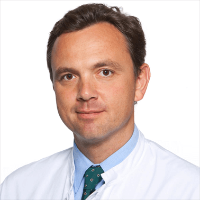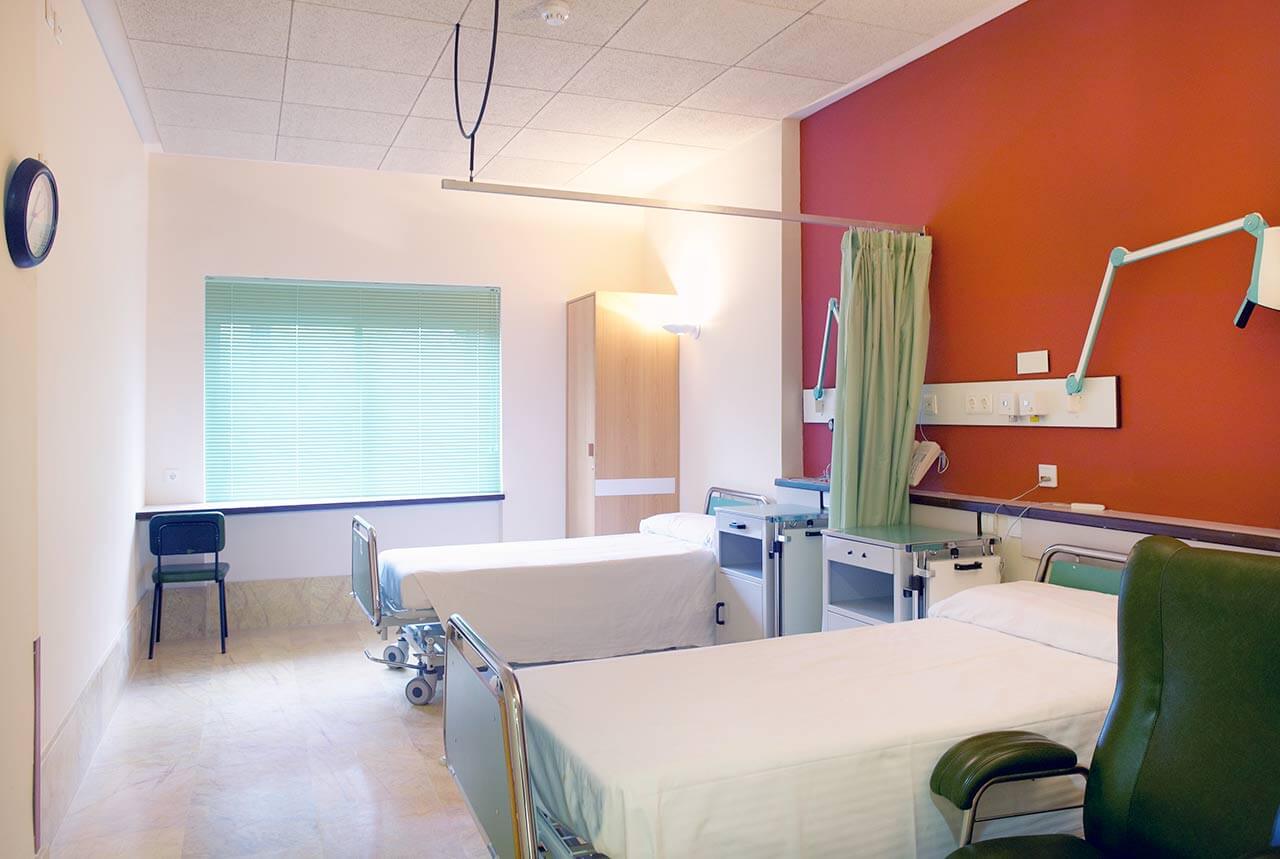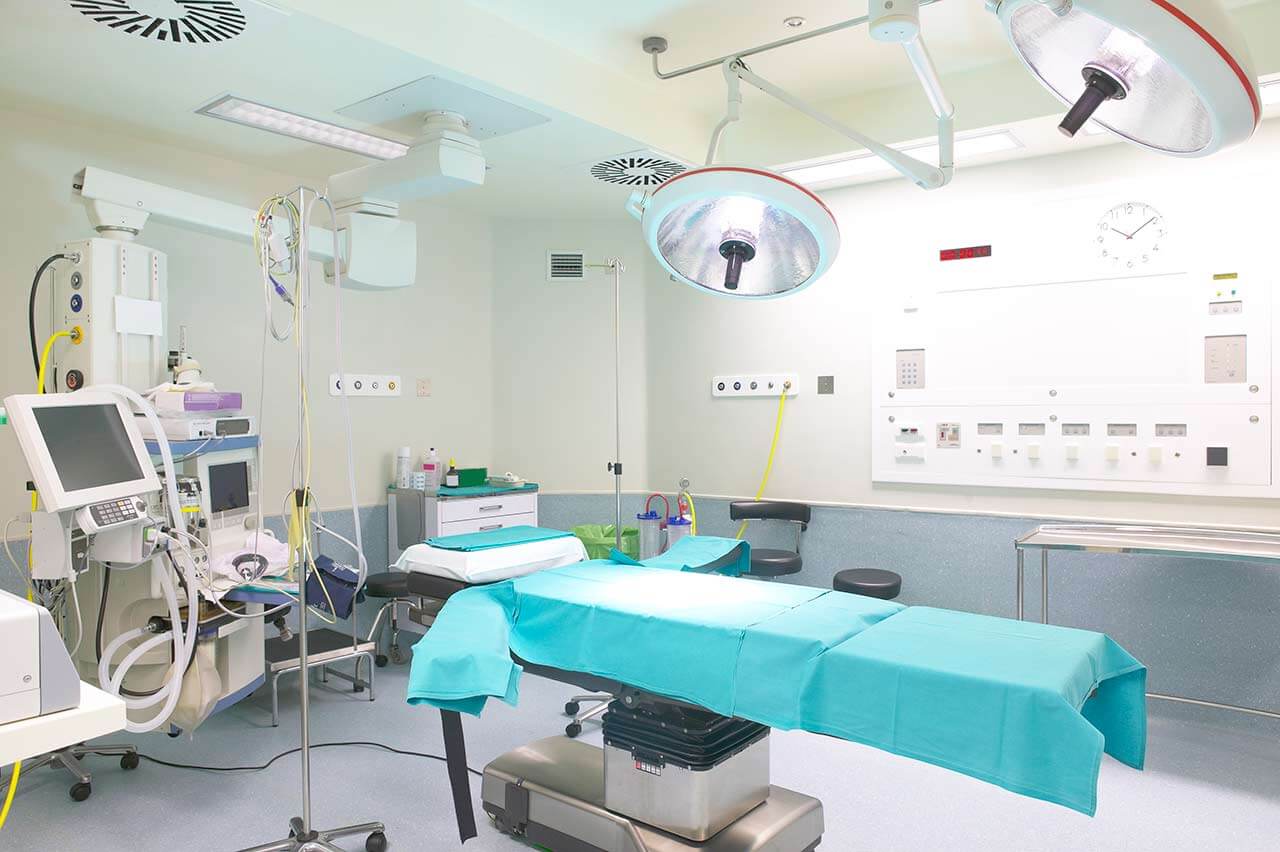
The program includes:
- Initial presentation in the clinic
- clinical history taking
- physical examination
- review of medical records
- laboratory tests:
- complete blood count
- general urine analysis
- biochemical analysis of blood
- tumor marker
- TSH-basal, fT3, fT4
- HLA typing/ PRA
- hepatitis (B,C) serology, HIV, CMV, EBV, TPHA
- tuberculin testing
- indicators of inflammation
- indicators blood coagulation
- ultrasound/MRI/CT of the abdomen
- x-ray of the chest
- lung function tests/ EKG
- liver vessels angiography
- a full range of donor examinations
- preoperative care
- transplantation
- symptomatic treatment
- control examinations
- the cost of essential medicines and materials
- the costs of donor operative treatment and accommodation
- nursing services
- full hospital accommodation
- explanation of future recommendations
How program is carried out
Service
You may also book:
 BookingHealth Price from:
BookingHealth Price from:
About the department
The Department of General and Abdominal Surgery, Colorectal Surgery, Hepatopancreatobiliary Surgery, Hernia Surgery, Endocrine Surgery, Vascular Surgery and Bariatric Surgery at the Hospital Cologne-Merheim offers surgical treatment for a wide range of diseases. The department performs operations for pathologies of the gastrointestinal tract, liver, pancreas, gallbladder, bile ducts, rectum, bowel, anus, thyroid gland, parathyroid glands, and adrenal glands. Particular competence is in the surgical treatment of stomach cancer, esophageal cancer, colon cancer, liver cancer, pancreatic cancer, gastrointestinal neuroendocrine tumors, gastrointestinal stromal tumors, and peritoneal carcinomatosis. Surgeons also specialize in the treatment of hernias, including inguinal hernias, umbilical hernias, and anterior abdominal wall hernias. The department admits patients with diseases of the vascular system, including occlusive peripheral arterial disease, carotid artery stenosis, and abdominal and thoracic aortic aneurysms. Another important focus in the department's clinical activity is bariatric surgery on patients with morbid obesity. The specialists excellently perform gastric banding, gastric bypass, sleeve gastroplasty, intragastric balloon placement, and biliopancreatic diversion with duodenal switch. The department regularly performs minimally invasive surgical techniques, promoting rapid postoperative recovery, minimizing pain, and practically eliminating health risks for the patient. The department's operating rooms have state-of-the-art equipment that allows for the most sparing and safe surgical treatment. The Head Physician of the department is Prof. Dr. med. Claus Eisenberger.
The department's team of abdominal surgeons operates on patients with benign and malignant abdominal diseases. The doctors have vast experience in the treatment of gastroesophageal reflux disease, achalasia cardia, Zenker's diverticulum, gastritis, stomach ulcers, benign neoplasms, and other pathologies. As a rule, patients with such pathologies are treated in close cooperation with gastroenterologists because many cases can be managed with drug therapy and/or endoscopic procedures. Complex cases, however, often require surgery. The patient's clinical case is therefore cooperatively considered by gastroenterologists and surgeons, after which they elaborate the optimal treatment regimen adapted to the needs of a specific patient.
The primary focus of the department's abdominal surgeons is to provide medical care to patients with gastrointestinal cancers, such as colon cancer, stomach cancer, pancreatic cancer, and esophageal cancer. The cornerstone of cancer treatment is the resection of a malignant tumor. The operation is complemented with chemotherapy, radiation therapy, targeted therapy, immunotherapy, and other conservative treatments. In advanced stages, malignancies of the digestive system often spread beyond the organ, affecting the peritoneum and lymph nodes. In such cases, a complete cytoreduction followed by hyperthermic intraperitoneal chemotherapy (HIPEC) is performed during surgery. During the procedure, a perfusion apparatus is used to deliver heated chemotherapy agents (40°C or higher) to the abdominal cavity after tumor removal. An important advantage of the HIPEC procedure is the local effect on the tumor, thanks to which the dose of chemotherapy drugs can be significantly increased without fear of severe side effects. An additional therapeutic effect is provided by heating chemotherapy agents, which increases their ability to penetrate into deep structures.
In the field of colorectal surgery, the department's specialists help patients with rectal, bowel, and anal diseases. The specialists most often treat anal cancer, hemorrhoids, anal eczema, anal fissures, sphincter dysfunction, rectal prolapse, anal prolapse, rectocele, anal abscesses, and other pathologies. The most demanded operations in this area include the Longo procedure, the STARR procedure, sphincter reconstruction, rectopexy, sacral neuromodulation, pilonidal cyst excision, and the Karydakis flap procedure.
The department's team of endocrine surgeons specializes in the treatment of thyroid diseases. Of particular interest is the treatment of thyroid cancer: papillary, follicular, medullary, and anaplastic. Diagnosis involves ultrasound scans, laboratory tests, biopsy, and scintigraphy. The main treatment method is tumor resection or total thyroid removal surgery, such as hemithyroidectomy or total thyroidectomy. Surgical procedures are performed using minimally invasive techniques using modern neuromonitoring systems to prevent damage to the recurrent laryngeal nerve. Radioiodine therapy and hormone therapy are used as complementary treatments to surgery.
The department has also gained successful experience in the surgical treatment of morbid obesity. It is important to realize that surgery is the last-line treatment after unsuccessful attempts to get rid of excess weight through diet and physical exercise. The department's surgeons perform all bariatric surgical procedures available in modern medicine, including gastric banding, gastric bypass, sleeve gastrectomy, intragastric balloon placement, and biliopancreatic diversion with duodenal switch. These interventions are performed using minimally invasive techniques and have high success rates.
It is worth noting that the department has been recognized as a Competence Center for Minimally Invasive Surgery certified by the German Society for General and Abdominal Surgery (DGAV) since February 2013. Surgeons work in state-of-the-art operating rooms using state-of-the-art equipment for minimally invasive interventions. Such surgical procedures have a number of advantages, including better aesthetic results, minimal pain, faster patient recovery after surgery, and a shorter hospital stay. It is noteworthy that this minimally invasive approach is as effective as conventional open surgery.
The department also successfully practices natural orifice transluminal endoscopic surgery (NOTES). Operations on abdominal organs are performed through the oral cavity or rectum, avoiding the formation of scars. Currently, this technique is also used for gallbladder removal in women through the vagina.
The department's surgical options include:
- Surgery for gastrointestinal and peritoneal diseases
- Surgery for malignant diseases
- Surgery for stomach cancer
- Surgery for colon cancer
- Surgery for esophageal cancer
- Surgery for pancreatic cancer
- Surgery for retroperitoneal cancer: peritoneal mesothelioma, peritoneal carcinomatosis, and appendiceal cancer spread to peritoneum
- Surgery for benign diseases
- Surgery for benign neoplasms
- Surgery for gastroesophageal reflux disease
- Surgery for achalasia cardia
- Surgery for gastritis
- Surgery for peptic ulcer disease
- Surgery for inflammatory bowel disease: Crohn's disease and ulcerative colitis
- Surgery for malignant diseases
- Surgery for rectal, colon, and anal diseases
- Milligan-Morgan hemorrhoidectomy and Longo procedure for hemorrhoids
- Resection rectopexy for rectal prolapse
- Fissurotomy and flap anorectoplasty for anal fissures
- Surgery for malignant anal and rectal tumor resection
- Sacral neuromodulation and sphincter reconstruction for fecal incontinence
- Surgery for liver, gallbladder, and bile duct diseases
- Surgery for malignant diseases
- Surgery for liver cancer and liver metastases
- Surgery for gallbladder cancer
- Surgery for benign diseases
- Surgery for gallstone disease
- Surgery for acute and chronic cholecystitis
- Surgery for benign liver and gallbladder tumors
- Surgery for malignant diseases
- Hernia repair surgery
- Shouldice repair
- Transabdominal preperitoneal (TAPP) hernia repair
- Intraperitoneal onlay mesh (IPOM) technique for hernia repair
- Surgery for thyroid, parathyroid, and adrenal diseases
- Hemithyroidectomy and thyroidectomy for thyroid cancer
- Parathyroidectomy for parathyroid diseases
- Adrenalectomy for adrenal diseases
- Surgery for diseases of the vascular system
- Surgery for occlusive peripheral arterial disease
- Surgery for carotid artery stenosis
- Surgery for diabetic foot syndrome
- Surgery for abdominal and thoracic aortic aneurysms
- Surgery for varicose veins
- Surgery for deep vein thrombosis
- Surgery for traumatic vascular injuries
- Surgery for morbid obesity
- Intragastric balloon placement
- Gastric banding
- Gastric bypass surgery
- Sleeve gastrectomy
- Biliopancreatic diversion with duodenal switch
- Other medical services
Curriculum vitae
Higher Education
- 1989 Medical studies, Eberhard Karl University of Tuebingen.
- 1992 First State Medical Examination.
- 1994 Second State Medical Examination.
- 1994 - 1995 United States Medical Licensing Examination (USMLE), Parts I and II.
- 1994 - 1995 Internship: Department of General Surgery, hospital at the University of Pretoria, South Africa; Department of Internal Medicine, St. Catherine's Hospital Stuttgart, Germany; Department of Cardiology, St. Catherine's Hospital Stuttgart, Germany; Department of Anesthesiology and Intensive Care, St. Catherine's Hospital Stuttgart, Germany.
- 1995 Third State Medical Examination.
Internships
- 1989 Sports Clinic in Stuttgart.
- 1989 - 1993 Departments of General Surgery, Traumatology and Otolaryngology at St. Mary's Hospital Stuttgart.
- 1991 - 1992 Research Fellow, Macroscopic Anatomy Course, Institute of Anatomy at the Eberhard Karl University of Tuebingen.
- 1992 Private Orthopedic Clinic in Munich.
- 1992 Department of Urology, St. Catherine's Hospital Stuttgart.
- 1992 - 1993 Department of General Surgery at the University Hospital Tuebingen.
- 1993 Department of Urology, Cedars-Sinai Medical Center in Los Angeles.
- 1995 Department of Urology and Transplant Surgery, Edouard Herriot Hospital.
Professional Career
- 1995 - 1997 Internship, Department of General Surgery, University Hospital Hamburg-Eppendorf.
- 1996 Work in the Department of Endoscopy and Endoscopic Surgery.
- 1997 Theoretical foundations of the specialty in Emergency Medical Care.
- Since 1997 Research Fellow and Assistant Physician, Department of Surgery, University Hospital Hamburg-Eppendorf.
- Since 1998 Work in the Department of General, Abdominal and Thoracic Surgery, University Hospital Hamburg-Eppendorf.
- 1998 Work in the Department of Traumatology and Reconstructive Surgery, University Hospital Hamburg-Eppendorf.
- 1999 Theoretical foundations of the specialty in Radiation Protection.
- 2002 Board certification in Surgery, Hamburg Medical Association.
- 2002 Foundation of the Department of Vascular Surgery on the basis of the Department of General, Abdominal and Thoracic Surgery, University Hospital Hamburg-Eppendorf.
- Since 09.2003 Senior Physician, Department of General and Abdominal Surgery, Pediatric Surgery at the University Hospital Duesseldorf.
- 08.2004 Board certification in Abdominal Surgery, Medical Association of North Rhine.
- 07.2009 Board certification in Thoracic Surgery, Medical Association of North Rhine.
- Since 2009 Deputy Head of the Department of General and Abdominal Surgery, Pediatric Surgery at the University Hospital Duesseldorf.
- Since 06.2011 Head Physician of the Department of General and Abdominal Surgery, Colorectal Surgery, Hepatopancreatobiliary Surgery, Hernia Surgery, Endocrine Surgery, Vascular Surgery and Bariatric Surgery at the Hospital Cologne-Merheim.
Clinical Focuses
- Surgical treatment of cancer.
- Surgical treatment of endocrine diseases.
- Surgical treatment of respiratory diseases.
- Surgical treatment of pancreatic and liver diseases.
- Minimally invasive surgery on the organs of the abdominal cavity and respiratory system.
Memberships in Professional Societies
- German Society of Surgery (DGC).
- Surgical Working Group for Endocrinology (CAEK).
- Surgical Working Group on Molecular Diagnosis and Therapy (CAMO).
- North-West German Association of Surgeons.
- German Society of Urology (DGU).
- Association of Bavarian Surgeons.
- German Society for Thoracic Surgery (DGT).
- Endourological Society.
- German Society for Gastroenterology, Digestive and Metabolic Diseases (DGVS).
- Association of Surgeons of the Middle Rhine.
- German Society for General and Visceral Surgery (DGAV).
- Professional Society of German Surgeons (BDC).
- German Society of Plastic, Reconstructive and Aesthetic Surgeons (DGPRÄC).
- German Cancer Society (DKG).
Photo of the doctor: (c) Kliniken der Stadt Köln gGmbH
About hospital
According to the reputable Focus magazine, the Hospital Cologne-Merheim ranks among the top German medical centers!
The health facility is an academic hospital of Witten/Herdecke University, which gives patients access to the very latest developments in European medicine. The Hospital Cologne-Merheim positions itself as a maximum care medical center, which is why it offers a wide range of high-quality medical services. The hospital has 752 beds in 13 specialized departments. More than 28,000 inpatients are treated here every year. Outpatient care is also provided for many medical specialties. The hospital also collaborates closely with the University Hospital Cologne, carrying out fruitful work at the Transplant Center.
The most successful areas of clinical practice in the medical center are neurosurgery, pulmonology, transplantology, surgery (in particular, minimally invasive), cardiology, traumatology, joint replacement surgery, and plastic surgery. The Departments of Ophthalmology, Anesthesiology, Radiology, Neuroradiology, and Palliative Care are also distinguished by top-class medical service. In addition, the Departments of Neurology and Neurosurgery provide effective early rehabilitation programs for patients with stroke, traumatic brain injuries, brain tumors, and other neurological diseases. Comprehensive treatment of such a level is available only at highly specialized and best medical facilities in Germany.
The hospital has several ultramodern intensive care units, where patients in critical condition are treated.
It is worth noting that the hospital was the first in the region to be certified in accordance with KTQ® (Cooperation for Transparency and Quality in Health Care). The certification process is repeated every three years, and each time the hospital passes it with excellent results.
The basis for high-quality medical services lies in state-of-the-art equipment, the application of effective and reliable therapeutic methods, and the vast clinical experience and professionalism of doctors and nursing staff. The main value for each employee at the hospital is the patient's health. Doctors devote enough time to personal communication with patients in order to establish a trusting relationship and explain the details of upcoming treatment.
Photo: (с) depositphotos
Accommodation in hospital
Patients rooms
The patients of the Hospital Cologne-Merheim live in single and double rooms. All patient rooms are cozy and designed in light colors. Each patient room has an ensuite bathroom with a shower and a toilet. The furnishings of a standard patient room include an automatically adjustable bed, a bedside table with a pull-out tray, a wardrobe for personal belongings, a table and chairs for receiving visitors, a TV, and a telephone. Wi-Fi is also available in the patient rooms.
If desired, patients may stay in an enhanced-comfort room, which additionally provides a safe, a mini-fridge, and upholstered furniture.
Meals and Menus
The patients are offered three tasty and healthy meals a day: breakfast, lunch, and dinner. Breakfast and dinner are served as buffets, and for lunch, there is a set of three menus to choose from.
If, for some reason, you do not eat all the foods, you will be offered an individual menu. Please inform the medical staff about your dietary preferences prior to treatment.
Further details
Standard rooms include:
Religion
There is a chapel on the territory of the hospital, where Catholic and Evangelical worship is regularly held on Sundays and religious holidays. The chapel is also open daily for visits and solitude for prayers.
The services of representatives of other religions are available upon request.
Accompanying person
Your accompanying person may stay with you in your patient room or at the hotel of your choice during the inpatient program.
Hotel
You may stay at the hotel of your choice during the outpatient program. Our managers will support you for selecting the best option.



